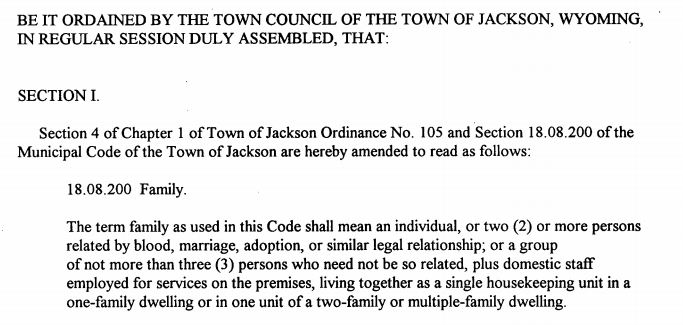On Nov. 15, 1993, “I’d Do Anything for Love” by Meat Loaf was the number one song in the U.S. The median price for a single-family home in Jackson was $235,000, and William Westbrook was the town’s mayor. Westbrook and the Jackson Town Council passed Ordinance 473 unanimously that Monday, which made it illegal for more than three unrelated people to live in a single-family home within Jackson’s town limits.

Ordinance 473 passed on Nov. 15, 1993. (Screenshot Courtesy of the Town of Jackson)
Fast forward 27 years and the median price of a single-family home in Jackson Hole is $2.5 million. And despite the official rule, more than three unrelated individuals often live together under one roof, according to local resident Hunter Singleton.
“I would say the vast, vast, vast majority of my peers are in single-family, standalone houses, usually three to four bedrooms,” he said.
Singleton lived in Richmond, Virginia, and San Francisco before moving to Jackson, but he said he’s struggled more to find housing in Jackson Hole than anywhere else. And to save money on rent, he lives in a technically illegal situation.
“I live with five people who are unrelated,” Singleton said, “as do most people I know here who are in standalone single-family houses and not, you know, two-bedroom condos.”
Single-family homes are the most common housing type in Jackson, according to local real estate data. Singleton said his current landlord is “laid back” and doesn’t care much about the law, but he’s still in danger of losing housing should that status quo change. That almost happened when he first moved to Jackson—two couples were sharing rooms in the house he was living in, and the landlord used 473 as leverage against them.
“You know, threatened to kick us out, threatened to raise rent, and brought up that ordinance,” Singleton said.
Singleton said they were able to work it out, but that situation was how he got introduced to Ordinance 473. Now, he’s in favor of repealing it. He said it gives too much power to landlords, and puts too many local workers in situations where they’re breaking a law despite living, by Jackson standards, quite normally.
Ariel Kazunas is also in favor of repealing the ordinance. Kazunas has had 10 different leases in her seven years in Jackson, and she said she’s constantly looking online for better housing.

Ariel Kazunas submitted public comment in support of repealing Ordinance 473 on Jan. 15. (Courtesy of Ariel Kazunas)
“And I have certainly responded to postings about housing and had people say ‘No, even though it’s a four-bedroom,'” Kazunas said. “‘You can’t have four people in here because we can only have three.'”
Kazunas said it’s disheartening to see her friends move away from town because they can’t afford to live here, even though she knows of available spare rooms. She also said zoning ordinances like this, which are found across the country, are discriminatory at their core. Several other towns, such as Boulder, Colorado, have also seen initiatives to try and repeal similar municipal ordinances.
“They’re not there to improve living conditions like overcrowding,” Kazunaas said. “Usually, they’re there because certain neighborhoods wanted to prevent less wealthy residents from moving in.”
The meeting minutes from November 1993 document that the town council approved the ordinance in order to maintain the integrity of single-family neighborhoods. But there’s one exception to the rule: domestic staff or housekeepers living on the premises don’t count as unrelated persons.
“But if you are four, you know, 20-somethings all working at the ski resort, that’s not okay,” Kazunas said.
Additionally, the definition of family has changed a lot over the past 27 years, according to Kazunas.
“A lot of folks aren’t married in this town, but they’ve been together for longer than most marriages last,” she said. “But they’re not considered related.”
So, they can’t apply for housing as a couple. Members of the local LGBTQ community have also accused the ordinance of discriminating against nontraditional families.
Community Development Director for the Town of Jackson Tyler Sinclair has been researching Ordinance 473 since the Town Council voted in support of looking into potentially repealing it in January. He said a lot has changed since the 1990s, but that he still hears complaints from local citizens about issues the ordinance is supposed to curb.
“When you get more than three people living in a house, we often receive complaints around kind of excessive parking, either on the front lawn, or adjacent to the property, or in kind of strange places,” Sinclair said.
Sinclair said he hears fewer complaints referencing 473 than he did, say, 10 years ago. In fact, the Jackson Police Department said it did not enforce the ordinance a single time in 2020.
But the three lone public comments the town has gotten in support of keeping the law all reference parking or diminishing neighborhood character as concerns. One citizen wrote that they were worried more than three unrelated people in a house could put unnecessary wear and tear on infrastructure, and clog transportation systems.
Both sides, Sinclair said, will have ample time to make their case in the coming months as the council deliberates the issue.
“[The council will hold] probably a minimum of five meetings,” he said. “I anticipate it could take more. I think there’s quite a few people interested in this, probably from both sides of the issue. And I think, you know, it’ll be a good opportunity for the public to engage with the council.”
While Kazunas, Singleton and others want the ordinance repealed as soon as possible, Sinclair said town laws intentionally dictate that potentially large changes like this move slowly. A decision about a law in place since 1993 will have lasting consequences moving forward, and the council needs time to deliberate. Plus, Sinclair said, not everyone is in tune with Town of Jackson agendas.
“So, I think that provides that back and forth just for simple notification to the public to let all the voices be heard,” he said.
Even if the ordinance does get fully repealed or amended, Kazunas said it’s just one small piece of the puzzle needed to fix Jackson’s affordable housing crisis and better protect tenants. Still, she said, every little bit helps renters like her.
“This just seems like such an easy step to take to get one obstacle out of the way for community members who are looking to find less expensive housing options,” Kazunas said.
Sinclair said he expects Ordinance 473 to come up for initial discussion at a Town Council Workshop in either March or April. At least one council member, Jessica Sell Chambers, has already spoken up in favor of repealing the ordinance.






